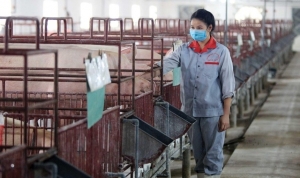Myriad of issues hinder livestock firms
The Vietnam Poultry Association (VIPA) has revealed that tens of thousands of tonnes of discarded live chickens are smuggled across the border into the country every month, along with many low-priced livestock by-products such as legs, heads, necks, wings, skins, gizzards, and offal.
 |
| Myriad of issues hinder livestock firms, illustration photo/ Source: freepik.com |
These items also carry risk of avian influenza virus strains and other dangerous infectious diseases imported from abroad.
Moreover, the cost of input materials and animal feed are increasing, and the poor selling prices are causing headaches for farmers and businesses. At times, the selling price of some poultry products can currently be 20-30 per cent lower than the production cost, pushing the poultry industry into numerous burdens.
Some businesses and poultry farms have already gone bankrupt, while thousands of farms have reduced their breeding scale or suspended operations due to prolonged losses.
Farmer Tran Van Be in the southern province of Dong Nai, who owns a 10-hectare chicken farm, said that his establishment has stopped work for more than two months because of heavy losses. He explained that the price of animal feed is at an average of 56 US cents per kg. To produce 1kg of broilers, they need 1.6kg of feed at least. So, all the costs for a 2kg chicken are around $2.25, while the selling price of a chicken is around $2.
“We raised about 500,000-700,000 chickens, and the total losses came to about VND4-5 billion ($167,000-208,000),” Be said.
Dinh Nhat Minh, a representative of Thanh Cong Livestock and Trade Co., Ltd., said the company was dissolved because it could not suffer the high input costs.
“It is too difficult to export at present. Previously, we could export in both formal and informal ways to Cambodia and China, but since the end of 2022, the Chinese side closed official roads, and minor roads were also tightened due to the threat of African swine fever,” Minh said.
Besides this, the price of animal feed has increased to 54 US cents from 41.7 US cents in the same period last year. “Some other livestock enterprises have even worse struggles because they borrowed money from banks and have to pay very higher interest rates,” Minh added.
Against this backdrop, the VIPA has proposed to the prime minister, the National Assembly Standing Committee, and relevant ministries and agencies in early June to consider a number of urgent and long-term solutions to remove difficulties for the poultry industry.
The association requests that competent authorities regularly inspect, control, prevent, and strictly handle organisations and individuals that are carrying out illegal transport and trade in poultry and poultry products across the borders.
The government should also promptly issue a document banning the import of meat products from countries that use growth stimulants like ractopamine and cysteamine, as well as review and cut some quarantine fees and unnecessary administrative procedures, it said.
The VIPA added that the current regulations on shipments for calculating quarantine fees for animals and animal products are not clear or reasonable. In fact, the customers of cattle and poultry slaughter plants are quite diverse. For example, a small customer can order about 5-10kg of meat only, but during quarantine, officials consider it as a shipment and charge $4.20, as much as the quarantine fee for a container. This regulation has raised the costs at poultry slaughterhouses.
On the other hand, while livestock and poultry breeding and slaughtering businesses are suffering, some other regulations like quarantine fees and independent conformity are adding more pressure on enterprises. “Therefore, we recommend ministries and agencies review and coordinate with each other to implement solutions reducing the cost of raw materials and inputs for agricultural production,” a VIPA representative emphasised.
“It is also necessary to specify the targets and roadmap for exporting key livestock products in each period, speeding up negotiations to expand the export markets of livestock products and supporting exporters to carry out administrative procedures and technical regulations,” the association added, highlighting practical actions like exemption and reduction of land rental, as well as supporting investment credit.
 | Tough times for livestock firms Since late last year, the agricultural sector, and livestock in particular, has been facing multiple hardships amid spiralling costs and lower returns, with several livestock businesses incurring losses. |
What the stars mean:
★ Poor ★ ★ Promising ★★★ Good ★★★★ Very good ★★★★★ Exceptional
Related Contents
Latest News
More News
- The generics industry: unlocking new growth drivers (February 04, 2026 | 17:39)
- Vietnam ready to increase purchases of US goods (February 04, 2026 | 15:55)
- Steel industry faces challenges in 2026 (February 03, 2026 | 17:20)
- State corporations poised to drive 2026 growth (February 03, 2026 | 13:58)
- Why high-tech talent will define Vietnam’s growth (February 02, 2026 | 10:47)
- FMCG resilience amid varying storms (February 02, 2026 | 10:00)
- Customs reforms strengthen business confidence, support trade growth (February 01, 2026 | 08:20)
- Vietnam and US to launch sixth trade negotiation round (January 30, 2026 | 15:19)
- Digital publishing emerges as key growth driver in Vietnam (January 30, 2026 | 10:59)
- EVN signs key contract for Tri An hydropower expansion (January 30, 2026 | 10:57)

 Tag:
Tag:



















 Mobile Version
Mobile Version